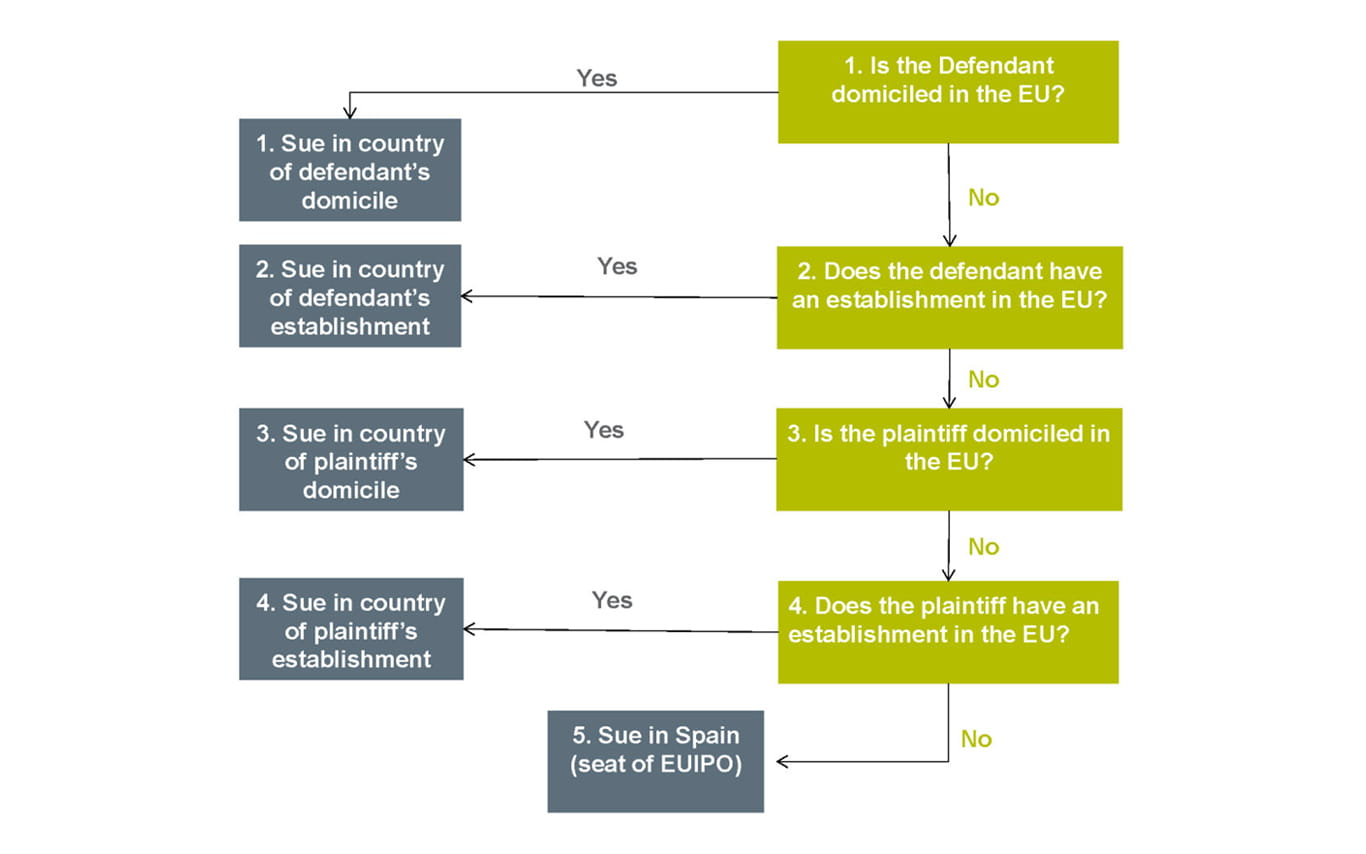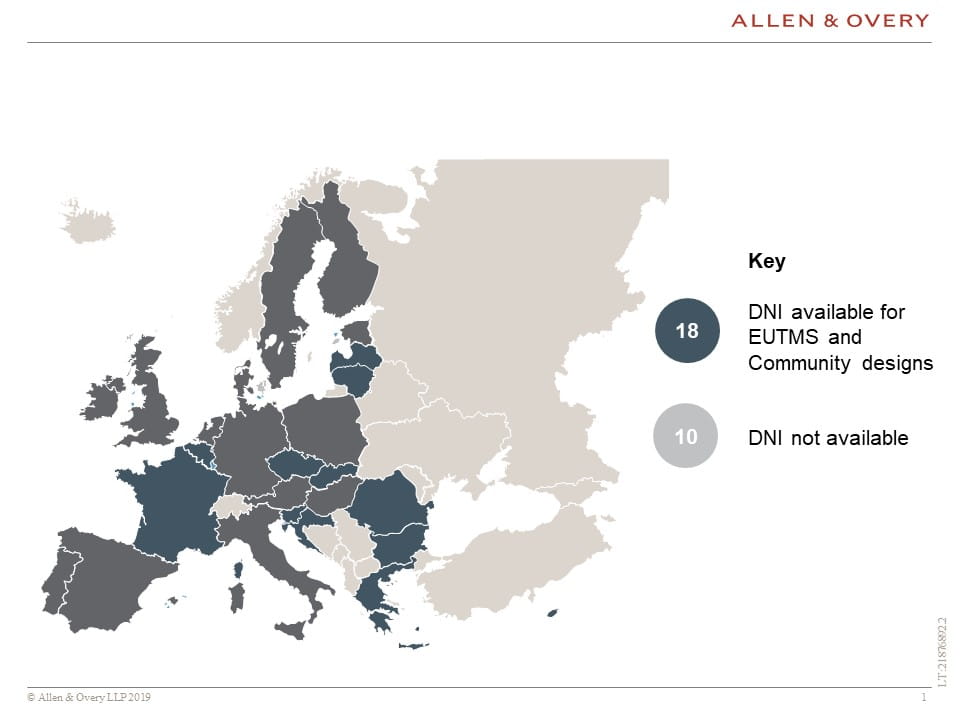Changes are needed to EU Law so declarations of non-infringement of EUTMS and Community designs are available across the EU: an A&O survey
Related people




David Stone
Partner
London

Beverley Potts
Senior Knowledge Lawyer
London

Tine Carmeliet
Senior Associate
Brussels

Jakub Cech
Senior Associate
Prague

Alexandre Rudoni
Partner
Paris

Andrea Dufaure
Senior Associate
Paris

Attila Komives
Counsel
Budapest

Frits Gerritzen
Partner
Amsterdam

Krystyna Szczepanowska-Kozlowska
Partner
Warsaw

Zuzana Hecko
Counsel
Bratislava
Headlines in this article
Related news and insights
Publications: 14 March 2024
Infringing gin part II: Court of Appeal victory for M&S against Aldi’s copycat design
News: 26 February 2024
Allen & Overy grows global IP practice with hire of life sciences specialist, Gemma Barrett
Publications: 22 January 2024
UPC Insights: Divisions disagree on rules for service on non-European defendants
A more detailed version of this article was first published in the Journal of Intellectual Property Law and Practice (Volume 14, Issue 10, pages 754-760)on 20 September 2019 and can be found here.
A business launching a product or service in the EU may want to obtain a court declaration that they are not infringing another’s EU trade mark (EUTM) or Community design. However, a recent survey conducted by A&O confirms that these declarations of non-infringement (“DNIs”) are not available in all EU member states and the possibility of obtaining a DNI depends on the arbitrary location of the IP owner’s domicile. Changes need to be made to EU law to rectify this situation to ensure that EU trade marks and Community designs are given uniform protection across the EU. In the meantime, organisations need to be alive to the current position and how it may affect any future EU launches.
What is a Declaration of Non-Infringement?
EUTMs and Community designs are powerful rights, which provide unitary IP protection across the whole of the EU. A trader may wish to ask a court for a declaration (a DNI) that its products or services do not infringe another’s EU trade mark or Community design anywhere in the EU. This can provide valuable certainty for those businesses who:
(i) wish to launch in the EU safe in the knowledge that there is no infringement; or
(ii) have already launched in the EU but have been subjected to dubious complaints from IP owners.
The business might prefer to take this proactive step rather than waiting to be sued for infringement or delaying the launch until the IP right expires. For these reasons, DNIs are important commercial tools and should be available in all EU member states. Unfortunately this is not the current position.
DNIs are not available in all member states
There are clear rules set out in EU legislation (known as the jurisdictional “cascade”), which determine which court should hear an action in relation to an EUTM or Community design. These rules “force” the plaintiff to commence proceedings in the courts of one particular member state rather than choosing the jurisdiction that suits it best:

Related expertise
Unfortunately, it is not always possible to obtain a declaration that an EUTM or Community design is not infringed in the courts of the member state identified by the cascade. This is because, under current EU trade mark and design legislation, it is only possible to obtain such a declaration if DNIs are permitted under the relevant national law.
An EU-wide survey conducted by A&O has confirmed that under national laws:
- only 18 member states allow DNIs;
- 10 member states do not allow DNIs

This is clearly contrary to EU law, which provides that EUTMs and Community designs should have equal effect and protection throughout the EU. Furthermore, it can impact EU-wide litigation. If the national law of the member state identified by the cascade does not permit a DNI, a plaintiff will be unable to obtain a pan-EU DNI in relation to an EUTM or Community design it is alleged to infringe. This benefits EUTM and Community design owners from the 10 member states not offering DNIs because they can threaten but not commence infringement proceedings, creating legal uncertainty whilst the allegedly infringing trader has no redress.
How can this work in practice?
A Spanish trader wishes to launch a product in Spain but is uncertain whether its proposed product infringes two IP rights that have effect in Spain:
(1) a Registered Community Design (RCD) owned by an Italian entity; and
(2) an EUTM owned by a French entity.
In order to obtain a DNI in relation to the RCD, under the cascade the Spanish trader must bring the action in the court of the defendant’s domicile, which is Italy. Italy allows DNIs so the Spanish trader can obtain a declaration that the sale of the new product in Spain and elsewhere in the EU does not infringe the RCD. The Spanish trader can then launch knowing that the Italian entity cannot sue it for RCD infringement.
However, in order to obtain a DNI in relation to the EUTM, under the cascade the Spanish trader must seek relief in the court of the domicile of the defendant, which is France. France doesn’t offer DNIs so no pan-EU declaration is possible. Furthermore, it is not possible to ask the Spanish court to grant a DNI that the EUTM is not infringed in Spain. If the French EUTM holder refuses to provide any comfort, the Spanish trader may have no choice but to launch the proposed product and wait to be sued for infringement of the EUTM. Proceedings at the EUIPO to invalidate the EUTM can take years so might not provide a satisfactory answer.
The result is that the path can be cleared for the RCD but not for the EUTM and these EU unitary rights are providing different levels of protection, based solely on the domicile of the IP owner. Taken to the extreme, a rights holder could intentionally file its EUTMs or RCDs in the name of an entity that is domiciled in one of the 10 member states that do not offer DNIs. Competitors are not able proactively to obtain clarification that they do not infringe these rights (either across the EU or in individual member states) and need to launch knowing they are at risk of an infringement suit and possible injunction. Recent CJEU cases[i][1] may assist against non-EU domiciled IP rights owners with multiple potential establishments but will not assist against IP owners domiciled in the EU.
How can these problems be rectified?
The EU-wide survey conducted by A&O has identified a clear deficiency in the remedies that are available under the current Community design and EUTM systems. It is clear that the availability of pan-EU DNIs should not be determined by an arbitrary factor such as the domicile of the rights owner. This issue needs to be addressed in relation to EUTMs and Community designs in the European Commission’s on-going review of the IP Enforcement Directive. A provision needs to be added to the IP Enforcement Directive such that the national laws of each and every member state provide for actions for DNIs for both EUTMs and Community designs.
A short word on BREXIT
It is still difficult to say with any certainty if and when the UK will leave the EU. Any negotiated withdrawal agreement is likely to contain a transitional period and EUTMs and RCDs will continue in force in the UK during that transition period. At the end of any transition period or in the event of a no-deal Brexit, the holders of existing EUTMs and RCDs will automatically become the owner of an equivalent UK child (or cloned) right. This means that the UK Courts will not be able to grant a pan-EU injunction in respect of EUTM and RCDs and pan-EU injunctions granted elsewhere will not have force in the UK. Businesses wishing to obtain injunctions or DNIs with effect in the EU and post-Brexit UK will need to initiate proceedings in both the UK and EU27. Further discussion on how IP rights are affected by Brexit can be found in this episode of A&O’s Brexit podcasts.